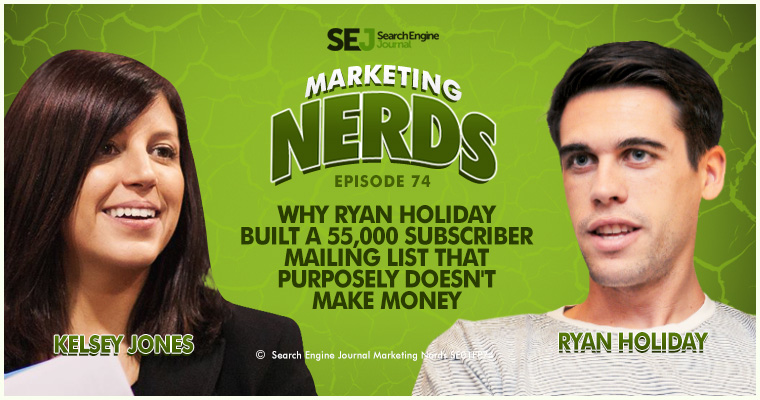Podcast: Download
Subscribe: Apple Podcast Google Podcasts Spotify
Visit our Marketing Nerds archive to listen to other Marketing Nerds podcasts!
In today’s episode, author of books like Trust Me, I’m Lying: Confessions of a Media Manipulator, marketer, and entrepreneur Ryan Holiday joins SEJ Executive Editor, Kelsey Jones, to talk about the surprising benefits of writing on what you’re passionate about. They also talked about how marketers can build genuine relationships with their audiences without thinking of sales as their top priority.

Here are a few transcribed excerpts from the discussion—make sure to listen to the podcast to hear everything:
Building a Genuine Email List
I think everyone wants to have a platform, but they usually want it right when they need it, and they don’t take the time to make it in advance. I was thinking, what would be something that I could offer of value to people, that was consistent with what I was interested in—consistent with my expertise? What could I offer in return that would make people give me their email address, so in the future I might be able to use it in some way?
I came up with this idea of recommending books. I used to recommend them on my site and I said, “No I’m going to do them on my email list,” so I started this email list. It was so small at first. I would just copy and paste everyone’s email into the BCC field in Gmail. Over the last six or seven years, that’s now gone up to 55,000 people I think.
It’s been great and I only send one email a month. I wanted it to be very different than how most emails work. It was one email a month, I just recommend other books. The idea is, can you make something that people actually want?
Everyone has an email list, so there’s something there, but how can I do it differently so mine doesn’t get lumped in with everyone else’s? That’s how I try to think about it.
Other Growth Hacking Strategies
There’s this great quote I like from Jason, the founder of Base Camp, where he’s saying,
“For your product to speak for itself, it has to have somebody to talk to.”
I feel like you should be building that platform or building that audience, so when you have something that you’re launching, it’s not just going out into nothing.
I think social media is important. You want to have a decent Twitter following, or Instagram, or whatever the social network. I’m a little suspicious of the social networks, if only because you don’t own that connection. People spend all this time building these huge Facebook followings, and then Facebook clamps down on organic reach, and now you can’t reach those fans that you paid all that money to get. I think social is important, but you can’t be dependent on it.
Having an audience who’s also interested in your writing—whether that’s your blog, or you contribute to a site—that’s also important because you can count on that, so you know if you were to have an idea that you wanted to get out in the world, you’re like, “Okay I publish every week on Medium, and I have 5,000 followers there. I know that 5,000 people are going to at least possibly look at this thing.”
You want to cultivate those opportunities and those channels, not because you need it every week, or every day, or whatever but someday you’re really going to need it. You want to have built up that karma and that capital far before you need it.
Writing About Your Passion and Interest
If I wrote a piece about the ten best tips for capitalizing on Google+ two years ago, that piece is dead in the water now, right? Jeff Bezos has that quote, “Focus on the things that don’t change,” and so when I’m writing about things I try to focus on those.
It’s also like, what gets you up in the morning that makes you excited to write?
I think most people could probably do without writing about a lot of these marketing topics. They just feel like they have to. They feel like they should, and that doesn’t produce great content in my opinion. Except for the few people that live and breath that stuff, and that’s what they should be writing about.
I think you also want to do some analysis on where your clients, or your leads, come from. If I wrote an article about marketing tips, in my experience that’s not what a marketing business’s clients like having. It either gets people who are very much beginners, don’t have the budget we need them to have, or it just doesn’t work. That’s just not how clients tend to find people they work with.
Writing for a Segmented Niche vs. Writing About What’s Working for You
I definitely think you want to have areas of domain expertise. Nobody wants to hire the person who’s okay at everything. They want someone who’s an expert at something.
Do you want to go so obscure that people only think you can do this one thing? I guess that depends on what kind of business you’re trying to build.
I do think developing lanes of expertise not only helps audiences identify you, but it helps you in general. For instance, one of my books is about stoic philosophy, which I’m really interested in and I’ve written about a lot. If I were to write an article about stoic philosophy right now, it would be really easy because I’ve already done a lot of the research. I know this topic inside and out. If a news event happened tomorrow, I could quickly adapt and come up with something.
If you’re writing about everything, it means you’re starting form scratch each time. Having some expertise allows you to link to prior things that you’ve written. Use examples you’ve used before. Call on people you’ve called on before. I think that is also important.
Keeping up With Your Reading List and Writing Assignments
One of my little secrets is, I made the reading list email so that reading books could never be not part of my job.
Treating reading and writing as part of your job, rather than an extra thing that you do when you get home from work, to me, was a big mind shift. I think it’s really important.
The secret to speed reading is not some course that you take that helps you read fast. If you gain some expertise about a specific topic, you become faster at reading books about that topic, because you have knowledge in that area.
Say I want to read five books over the course of this year around this topic. I’ll start to get familiar with it, I’ll start to agree or disagree with the author, I’ll recognize the names, I’ll know the places, I’ll be able to anticipate what’s coming next. Really zooming in rather than being spread thin, I think can help you speed up; you start to get really passionate about the topic that you’re reading about. Those are two secrets I like to use.
To listen to this Marketing Nerds podcast with Ryan Holiday and Kelsey Jones:
- Download and listen to the full episode at the bottom of this post
- Subscribe via iTunes
- Sign up on IFTTT to receive an email whenever the Marketing Nerds podcast RSS feed has a new episode
- Listen on Stitcher
Think you have what it takes to be a Marketing Nerd? If so, message Kelsey Jones on Twitter, or email her at kelsey [at] searchenginejournal.com.
Visit our Marketing Nerds archive to listen to other Marketing Nerds podcasts!
Image Credits
Featured Image: Image by Paulo Bobita
In-post Photo: Antonio Guillem/Shutterstock.com





![AI Overviews: We Reverse-Engineered Them So You Don't Have To [+ What You Need To Do Next]](https://www.searchenginejournal.com/wp-content/uploads/2025/04/sidebar1x-455.png)